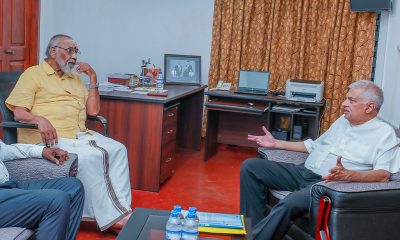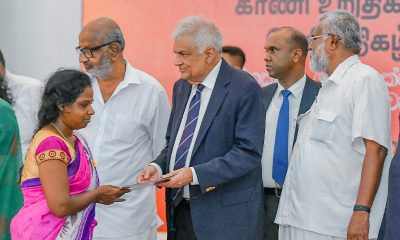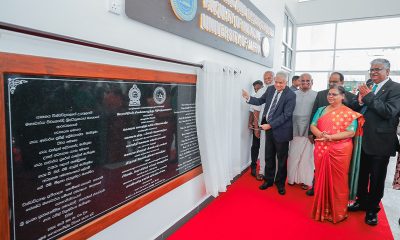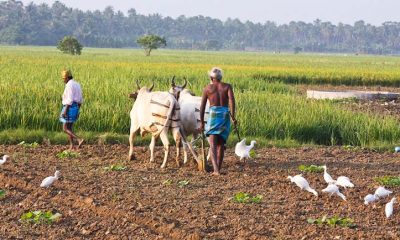Features
Territorial policing in Ratnapura and a dreaded transfer to Jaffna
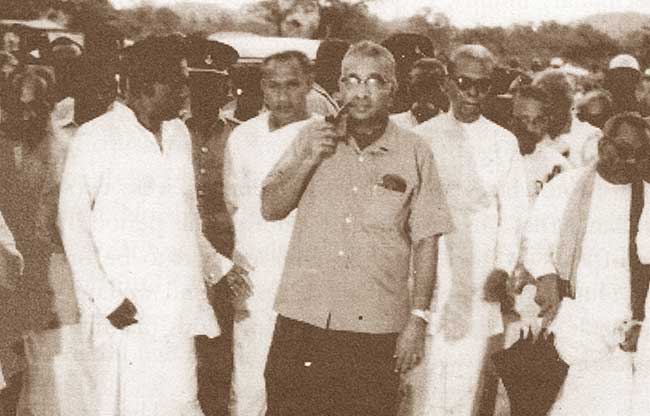
(Excerpted from the memoirs of Senior DIG (Retd.)
Kinglsley Wickramasuriya)
When I took over Ratnapura Division I found that there were a large number of pending disciplinary inquiries and out of this many were the cases where the charge-sheeted officers have been interdicted from service for trivial reasons that I considered to be unjust punishment. I called for all those files where disciplinary inquiries were pending from the ‘Strength Clerk’ and went through them one by one burning the midnight oil.
I worked on them even during weekends and saw to it that those that had been interdicted unjustly were reinstated. At the same time, I saw to it that the accumulation of those delayed inquiries was expeditiously disposed of and justice meted out.
While at Ratnapura, I started experimenting with the inspection methodology that I learned under DIG CR Arndt and systematizing my inspections of Police stations, visits, and night rounds so that I knew exactly what I was going to do next. With this, I kept up the surprise element in the Division so that no one knew at what moment and where I would surface. I eventually prepared a ‘Handbook of Inspections’, a virtual guideline for inspections based on management principles for the guidance of inspecting officers. Furthermore, I devoted my free time to developing the sports talent in the Division which enabled the Division win the coveted prize for seven-a-side Rugger.
The MP for Ratnapura once dropped in at my office and made representations on behalf of one of his constituents against Kuruvita Police and wished that I direct Kuruwita Police to take action that would favor his constituent. Accordingly, I made inquiries and found that OIC Kuruwita had acted properly. I informed the MP accordingly and left it at that. But the MP wouldn’t accept the position. He appeared in my office a second time and wanted me to do things the way he wanted.
When I made it clear that that was not possible, he threatened to have me transferred alleging that he knew what I was doing when I was in the ISD covering the UNP etc. I was surprised how he knew what I was doing in the ISD as what I did there was on a ‘need to know’ basis unless somebody inside had squealed against me. I told the MP that what I did at the ISD was none of his business and dared him to arrange a transfer for me as that would be the best that could happen to me at that time.
I had come to Ratnapura on transfer from the ISD because of the IGP’s position on promotions. By then I had come to a situation where I was sick of moving house now and then, and particularly arranging transfers for my wife whenever I went on transfer. Once she nearly lost her job owing to the Education Department’s difficulty in finding her a suitable school in an area to which I was assigned. Finally, having found a school in Colombo on my transfer to ISD, I decided to leave the family behind in case of future transfers.
Here in Ratnapura, I was without my family and was going through enormous difficulties, running a house. However, I had an understanding with the IG Ana Seneviratne who knew my problems that he would bring me back to Colombo at the earliest possible time. So, a transfer would have been very welcome. Nevertheless, I stood by the action taken by the OIC despite the MP’s threat, as that was the proper action to take.
In another instance when 1 walked into the Ratnapura police station one morning, I found Mr. Vasudeva Nanayakkara, well-known as a prominent activist of the left, seated on a bench inside the station. I inquired why he was there and was told that he had been detained for hoisting a black flag on the road opposite the police station in protest against the government on some political issues.
When I went into the matter, I found that this was a bailable offence where a person need not be detained. Accordingly, I instructed the HQI to release him on bail without allowing him to become a ‘hero’ at the expense of the police action. As a result of his release, we avoided him making an issue out of the incident.
During the rainy season, Ratnapura town and the surrounding area get flooded. During this period police are called upon to play the good Samaritan rescuing stranded people, distributing dry rations to those marooned, and operating other emergency services. Floods sometimes cut my bungalow off from the rest of the town and I had to be transported by boat. Police depended on the Navy for boats for rescue operations and these boats were very useful for such duty. We had to work in close collaboration with the Government Agent and his staff in carrying out flood relief work. So the SSP Ratnapura and the Government Agent worked in close collaboration to provide relief to the community at such times. As a result, we developed a close relationship.
Meanwhile I did a round of inspections of several police stations in the Division on the new lines learned under DIG Arndt, developing a new management approach to inspections of Police Stations. Several OICs of stations treasured the reports I gave them based on how they managed their stations. They kept copies of extracts for future reference.
I too drew immense satisfaction from the results I achieved at these inspections. They were not mere `book inspections’ but real value-added assessments that gave proper directions to the OICs showing their strengths and weaknesses.
The exposition of ‘Kapilavastu relics’ was another important event during my tour of duty at Ratnapura. The sacred relics were brought to Avissawella and Prime Minister Dudley Senanayake graced the occasion. All security arrangements were arranged by me. Range DIG Sylvester Joseph was on hand to supervise the arrangements. The event passed without any untoward incident.
The much wanted transfer finally came in August 1978 to Mount Lavinia Division, thanks to IG Police, Ana Seneviratne who kept his word.
Mount Lavinia
Mt. Lavinia and Moratuwa Police Districts came under the Division. There was much crime reported at Mt. Lavinia police station. So much so that officers attached to the Crime Branch were unable to make use of their leave and were under heavy work pressure. Looking for ways to ease this pressure, I came upon a system of community policing adopted by my predecessor, Superintendent Vamadevan used during the communal riots.
That was mostly a system of joint `Neighborhood Watch’ by the citizens and the Police. I revived the system by establishing Neighborhood Patrols throughout the police station area with some success proving that ‘prevention is better than cure.’
Before my taking over the Division a mutinous situation had taken place at the Moratuwa police station where several juror officers had reported ‘sick’ over some issue. I became aware of it when the disciplinary inquiry file came to me after the completion of the disciplinary inquiry.
I took a very serious view of the breakdown in the discipline where even officers on probation had participated. I recommended severe punishment for the miscreants. The DIG, however, took a different view and dealt with those found guilty leniently.
Motor races and Bellanwila Perahera were two other major events that I had to look after during this period. In both these officers from outside the division had to be brought in for special duty. Looking after their discipline and welfare was a major and difficult commitment that needed previous planning and proper organization.
Motor races in Mount Lavinia were an ad hoc event organized at the behest of Minister Athulathmudali who was the MP for the area. I used a double-decker bus as my Command Room from where I could survey the entire area of operation. This was a new experiment I carried out later to be used successfully at the Bellanwila Perehara as well. The minister commended the security arrangements made for the motor races and was pleased that everything went well.
The Mount Lavinia police station was in a dilapidated state and was due for repairs. Having received funds to build a new police station the foundation stone was laid. Minister Lalith Athulathmudali and Range DIG Sylvester Joseph were present on the occasion.
Barely a year had passed when I was suddenly called up by the IG to his office and asked to go in charge of the Jaffna Division. DIG Cyril Herath who was in charge of the Northern Range was also with him. From their conversation, I understood that they were in a bit of a difficult situation to find someone to go in charge of the Jaffna Division. IG said that it was only for one year and that one year of service in the North was being made mandatory for all officers in the Department.
It was difficult to say NO to either officer, IG Ana Seneviratne or DIG Cyril Herath, and back out of the situation for they were two officers in the Department for whom I had the highest respect. Fearful though of the uncertain situation in Jaffna because of the prevailing political violence, I agreed to the transfer.
When I came home and informed the family of the impending transfer to Jaffna, they were highly agitated. I decided to go alone without the family leaving them behind in Colombo promising them that they could join me during the school holidays. Anyway, going to Jaffna was a fearful proposition not knowing what exactly was in store for you. That being how I felt about the transfer you can just imagine what the family situation may have been.
Apart from my security, I had to worry about running a house. Although the security situation had changed, government regulations regarding establishment matters had not. As a result, we had, to fend for ourselves as in a normal situation and bear the additional burden.
Jaffna (Community Policing Experiment)
So, I took the train and reported to Jaffna on August 5, 1979. I was picked up at Jaffna’s end by the HQl Gunasinghe who was waiting for me. There was a huge bungalow of Dutch vantage inside Jaffna Fort that was to be my official residence. Adjoining was the King’s House where the VIPs stayed when visiting Jaffna. My house was equipped with a few pieces of government furniture, an iron bed, a few chairs, etc.
A civilian office peon was prepared to cook for me. My driver was quartered in the nearby single men’s barracks and was available in an emergency. My office was just outside the Jaffna Fort. Inside the Fort were some tennis courts where some civilians played.
I came to Jaffna at a time when the government had declared a state of Emergency and sent Brigadier (Bull) Weeratunga with troops with an edict from President J.R. Jayewardene to annihilate terrorism in the North within 72 hours. The general atmosphere in the entire peninsular was one of eerie silence.
By 6.00 pm the entire peninsula would put up shutters and there was hardly a soul to be seen on the streets after dark. Fear, mistrust, and suspicion were the order of the day. So much so, that once when I visited Kankesanturai (KKS) the ASP told me that he would not go even to the toilet without his weapon.
But after about two weeks in Jaffna, I found that everybody including the police had misread the prevailing general situation.
Crimes were being committed by ordinary criminals blaming them on LTTE and going Scot-free. With the army moving in, the hardcore LTTE cadres left the shores and fled to South India. It was easy for ordinary criminals, therefore, to go on the spree pretending to be LTTE. With this assessment of the situation, I went before the Police in Jaffna HQ station and later all over the peninsular urging them that the solution lies with the community cooperating with the police and urging launching a campaign to solicit police – community cooperation. But the police were skeptical that anything worthy will result from such an approach. Their response was negative.
Albeit this negative attitude of the police, I decided to summon a meeting of the leading citizens of Jaffna town and I was careful to include TULF supporters among the participants. The Mayor of Jaffna Visvanathan was one prominent among them. All OICs of stations in the peninsula were also summoned to witness the proceedings.
In my opening speech, I analyzed the crime situation in the peninsula and the fear created thereby and convinced the audience that crimes were being committed by ordinary criminals in the guise of terrorists taking advantage of the current situation and that the need of the hour was public support for police to contain this trend successfully. My appeal for public support went down well with the audience and their response was positive.
Not even two weeks elapsed after the first meeting at Jaffna HQ that a case of public intervention in a robbery of an old couple in the Kopay Police Station area was reported. A few members of the public had grappled with the robbers, arrested them, and handed them over to the police. On hearing of this, I immediately proceeded to the police station, summoned those members of the public who braved the incident, and presented them with a letter of commendation for their bravery. The event was given wide publicity in the local press.
I went around to the other police stations as well with the same message to be hailed by the participants as a positive step with the promise of cooperation.This demonstration of support for the police from the community proved to the police that their negative assessment was faulty and that there was a large measure of goodwill flowing that has to be organized and sustained. I was wracking my brain about how to achieve this objective when suddenly I came upon an idea that helped me solve the problem.
Thinking of a solution I was alarmed that the current trend was one of a movement that had placed popular trust in me. This was not at all conducive to sustainability. If the movement was to continue even after I left confidence needed to be placed not on a personality but on a system or an organization. So, I decided to design a system that would be in the hands of the local people rather than on an individual.
Evolving of Police-Public Relations Committees in respect of each police station was the result. The Committees worked according to a given Constitution adopted by each Committee based on power-sharing and democratic principles. I went around the peninsula once again to each police station explaining the scheme and establishing the committees. The main idea was to bring the police closer to the community in a collaborative effort to ensure safety, peace, and harmony in the community.
To bolster this scheme police organized sports meets and celebrations during the Sinhala / Tamil New Year period as usually done by the police in the other areas of the country. People enjoyed these events immensely and thanked the police for their leadership. I was invited to several places for the distribution of prizes which I gladly did accompanied by my wife.
While I was in the process of ‘winning the hearts and minds’ of the community it was also important to win the confidence of the Catholic Church. Inspector Pathmanathan attached to Jaffna HQ Police Station paved the way for this. He took me to the Bishop of Jaffna and after a cordial conversation and explanation of what I was doing in Jaffna to restore peace and harmony, I was able to win his support for my campaign. Eventually, we were able to celebrate Christmas with Police Christmas Carols with the Police Band and the Cultural Troupe of the Police Reserve in attendance.
Apart from all this activity, considering the influence the TULF had on the general population in the area I thought it prudent to establish a rapport with its hierarchy if my program was to be successful. So, the Police—Community Relations program opened the door for a relationship with the TULF as well. I was open handed in my response to various requests made by the TULF that I could be generous with.
The high command was treated with all due courtesy and respect. After all, Mr. Appapillai Amirthalingam was the Leader of the Opposition. As the law order situation improved and tranquility returned in the peninsula, I paid a courtesy call t o him and briefed him about the law and order situation in the peninsula and my Police—Community Program.
He was pleased that I was doing my best to serve the people and promised every possible support stating that he did not wish to see any more bloodshed in the region. Taking this opportunity later and on the instructions of IG Police, I arranged a conference of all the Police — Community Relations Committees of the peninsula to review the work they have done. Mr. Amitralingam graced the occasion as the chief guest. Te event was attended by DIG (NR) P. Mahendran. Jaffna GA was represented by his Deputy.
Addressing the gathering Leader of the Opposition spoke of the bitter relations with the police that he and his wife had experienced in the past and that he was happy the situation has changed for the better with a word of praise for the work being done by the PCR Committees. He was empathetic toward the difficulties the police officers were undergoing. He repeated these sentiments in Parliament when he spoke on November 26, 1980 (Hansard Column 881-882).
Further, in the course of participating in these PCR meetings, I had the occasion to listen to some of the difficulties that the people faced in their transactions with the police. One major problem was the difficulty faced by the public in courts on account of the first complaint being recorded by police officers not proficient in the Tamil language. The maority of policemen were Sinhala speaking,
To overcome this problem, I immediately made internal arrangements to ensure that as far as possible Tamil Speaking officers were put on ‘Reserve Duty’ so that the first complaint is properly recorded to circumvent the legal problems in courts.
In addition, I started Tamil classes for Sinhala speaking officers with the help of volunteers and offered them all facilities in the study of the language. Unfortunately, I didn’t have the opportunity of learning the language myself as nearly all those came in contact with in my daily routine, spoke either in English or was conversant in Sinhala. Even my office peon whom I had given strict instructions to speak to me in Tamil avoided doing so. Nevertheless, this disability did not deter me from being close to the ordinary man on the street.
Features
Rebuilding Sri Lanka: 78 Years of Independence and 78 Modules of Reform
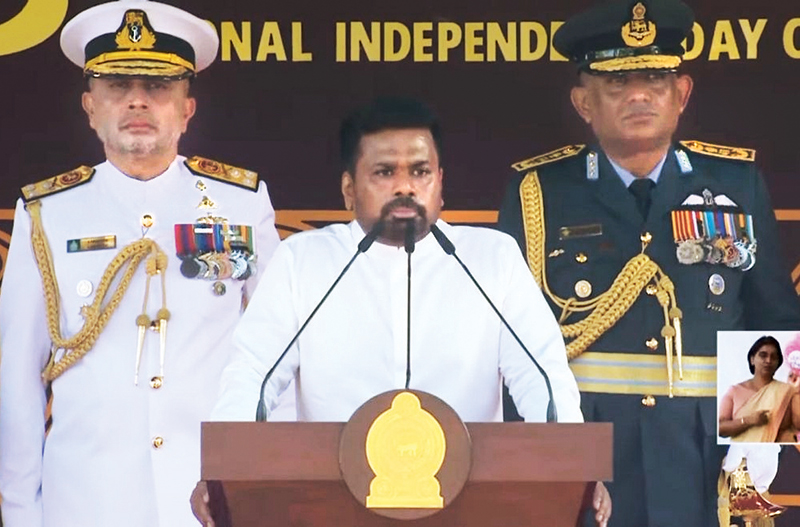
“The main theme of this year’s Independence Day is “Rebuilding Sri Lanka,” so spoke President Anura Kumara Dissanayaka as he ceremonially commemorated the island’s 78th independence anniversary. That was also President AKD’s second independence anniversary as President. Rebuilding implies that there was already something built. It is not that the NPP government is starting a new building on a vacant land, or whatever that was built earlier should all be destroyed and discarded.
Indeed, making a swift departure from NPP’s usual habit of denouncing Sri Lanka’s entire post independence history as useless, President AKD conceded that “over the 78 years since independence, we have experienced victories and defeats, successes and failures. We will not hesitate to discard what is harmful, nor will we fear embracing what is good. Therefore, I believe that the responsibility of rebuilding Sri Lanka upon the valuable foundations of the past lies with all of us.”
Within the main theme of rebuilding, the President touched on a number of sub-themes. First among them is the he development of the economy predicated on the country’s natural resources and its human resources. Crucial to economic development is the leveraging of our human resource to be internationally competitive, and to be one that prioritises “knowledge over ignorance, progress over outdated prejudices and unity over division.” Educational reform becomes key in this context and the President reiterated his and his government’s intention to “initiate the most transformative era in our education sector.”
He touched on his pet theme of fighting racism and extremism, and insisted that the government “will not allow division, racism, or extremism and that national unity will be established as the foremost strength in rebuilding Sri Lanka.” He laid emphasis on enabling equality before the law and ensuring the supremacy of the law, which are both necessary and remarkable given the skepticism that is still out there among pundits
Special mention was given to the Central Highlands that have become the site of repeated devastations caused by heavy rainfall, worse than poor drainage and inappropriate construction. Rebuilding in the wake of cyclone Ditwah takes a special meaning for physical development. Nowhere is this more critical than the hill slopes of the Central Highlands. The President touched on all the right buttons and called for environmentally sustainable construction to become “a central responsibility in the ‘Rebuilding Sri Lanka’ initiative.”. Recognizing “strong international cooperation is essential” for the rebuilding initiative, the President stated that his government’s goal is to “establish international relations that strengthen the security of our homeland, enhance the lives of our people and bring recognition to our country on a new level.”
The President also permitted himself some economic plaudits, listing his government’s achievements in 2025, its first year in office. To wit, “the lowest budget deficit since 1977, record-high government revenue after 2006, the largest current account balances in Sri Lanka’s history, the highest tax revenue collected by the Department of Inland Revenue and the sustained maintenance of bank interest rates at a long-term target, demonstrating remarkable economic stability.” He was also careful enough to note that “an economy’s success is not measured by data alone.”
Remember the old Brazilian quip that “the economy is doing well but not the people.” President AKD spoke to the importance of converting “the gains at the top levels of the economy … into improved living standards for every citizen,” and projected “the vision for a renewed Sri Lanka … where the benefits of economic growth flow to all people, creating a nation in which prosperity is shared equitably and inclusively.”
Rhetoric, Reform and Reality
For political rhetoric with more than a touch of authenticity, President AKD has no rival among the current political contenders and prospects. There were pundits and even academics who considered Mahinda Rajapaksa to be the first authentic leadership manifestation of Sinhala nationalism after independence, and that he was the first to repair the rupture between the Sri Lankan state and Sinhala nationalism that was apparently caused by JR Jayewardene and his agreement with India to end the constitutional crisis in Sri Lanka.
To be cynical, the NPP or AKD were not the first to claim that everything before them had been failures and betrayals. And it is not at all cynical to say that the 20-year Rajapaksa era was one in which the politics of Sinhala nationalism objectively served the interests of family bandyism, facilitated corruption, and enabled environmentally and economically unsustainable infrastructure development. The more positive question, however, is to ask the same pundits and academics – how they would view the political authenticity of the current President and the NPP government. Especially in terms of rejecting chauvinism and bigotry and rejuvenating national inclusiveness, eschewing corruption and enabling good governance, and ensuring environmental stewardship and not environmental slaughter.
The challenge to the NPP government is not about that it is different from and better than the Rajapaksa regime, or than any other government this century for that matter. The global, regional and local contexts are vastly different to make any meaningful comparison to the governments of the 20th century. Even the linkages to the JVP of the 1970s and 1980s are becoming tenuous if not increasingly irrelevant in the current context and circumstances. So, the NPP’s real challenge is not about demonstrating that it is something better than anything in the past, but to provide its own road map for governing, indicating milestones that are to be achieved and demonstrating the real steps of progress that the government is making towards each milestone.
There are plenty of critics and commentators who will not miss a beat in picking on the government. Yet there is no oppositional resonance to all the criticisms that are levelled against the government. The reason is not only the political inability of the opposition parties to take a position of advantage against the government on any issue where the government is seen to be vulnerable. The real reason could be that the criticisms against the government are not resonating with the people at large. The general attitude among the people is one of relief that this government is not as corrupt as any government could be and that it is not focused on helping family and friends as past governments have been doing.
While this is a good situation for any government to be in, there is also the risk of the NPP becoming too complacent for its good. The good old Mao’s Red Book quote that “complacency is the enemy of study,” could be extended to be read as the enemy of electoral success as well. In addition, political favouritism can be easily transitioned from the sphere of family and friends to the sphere of party cadres and members. The public will not notice the difference but will only lose its tolerance when stuff hits the fan and the smell becomes odious. It matters little whether the stuff and the smell emanate from family and friends, on the one hand, or party members on the other.
It is also important to keep the party bureaucracy and the government bureaucracy separate. Sri Lanka’s government bureaucracy is as old as modern Sri Lanka. No party bureaucracy can ever supplant it the way it is done in polities where one-party rule is the norm. A prudent approach in Sri Lanka would be for the party bureaucracy to keep its members in check and not let them throw their weight around in government offices. The government bureaucracy in Sri Lanka has many and severe problems but it is not totally dysfunctional as it often made out to be. Making government efficient is important but that should be achieved through internal processes and not by political party hacks.
Besides counterposing rhetoric and reality, the NPP government is also awash in a spate of reforms of its own making. The President spoke of economic reform, educational reform and sustainable development reform. There is also the elephant-in-the-room sized electricity reform. Independence day editorials have alluded to other reforms involving the constitution and the electoral processes. Even broad sociopolitical reforms are seen as needed to engender fundamental attitudinal changes among the people regarding involving both the lofty civic duties and responsibilities, as well as the day to day road habits and showing respect to women and children using public transport.
Education is fundamental to all of this, but I am not suggesting another new module or website linkages for that. Of course, the government has not created 78 reform modules as I say tongue-in-cheek in the title, but there are close to half of them, by my count, in the education reform proposals. The government has its work cut out in furthering its education reform proposals amidst all the criticisms ranged against them. In a different way, it has also to deal with trade union inertia that is stymieing reform efforts in the electricity sector. The government needs to demonstrate that it can not only answer its critics, but also keep its reform proposals positively moving ahead. After 78 years, it should not be too difficult to harness and harmonize – political rhetoric, reform proposals, and the realities of the people.
by Rajan Philips
Features
Our diplomatic missions success in bringing Ditwah relief while crocodiles gather in Colombo hotels
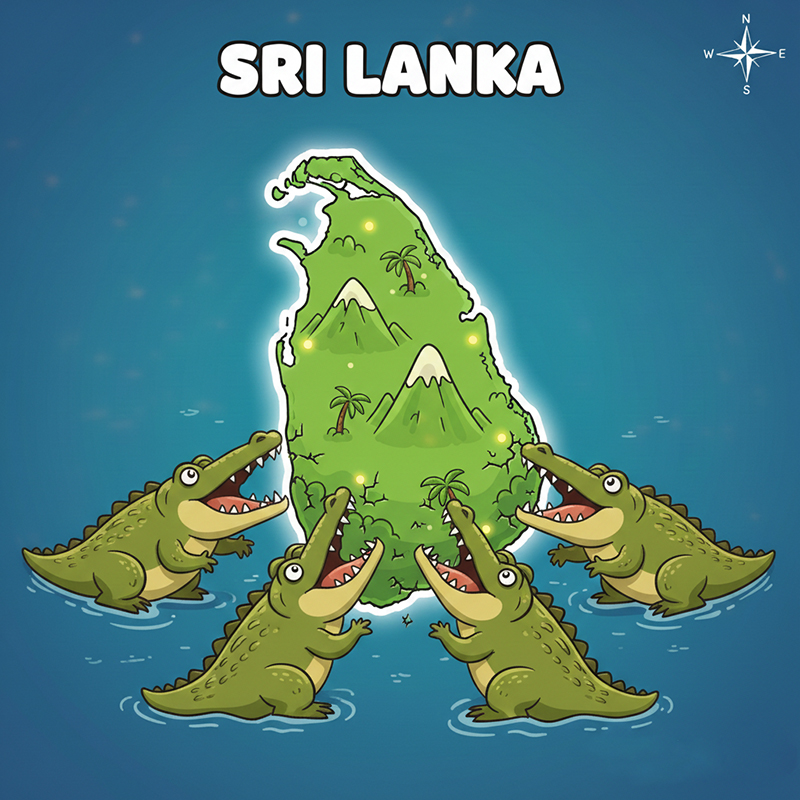
The Sunday newspapers are instructive: a lead story carries the excellent work of our Ambassador in Geneva raising humanitarian assistance for Sri Lanka in the aftermath of Ditwah. The release states that our Sri Lankan community has taken the lead in dispatching disaster relief items along with financial assistance to the Rebuilding Sri Lanka fund from individual donors as well as members of various community organizations.
The International Federation of Red Cross and Red Crescent Societies In Geneva had initially launched an appeal for Swiss francs CHF 5 million and the revised appeal has been tripled to CHF 14 million to provide life saving assistance and long term resilience building for nearly 600,000 of the most vulnerable individuals; the UN office for Coordination of Humanitarian Affairs has contributed US$4.5 million; the WHO has channeled US$175,000; In addition, our mission is working closely with other UN and International organizations in Geneva for technical support to improve disaster preparedness capacity in the long term in Sri Lanka such as through enhanced forecasting to mitigate risks and strengthen disaster preparedness capacities.
In stark contrast it is ironic to see in the same newspaper, a press release from a leading think tank in Colombo giving prominence to their hosting a seminar in a five star hotel to promote the extraction of Sri Lanka’s critical minerals to foreign companies under the guise of “international partners”. Those countries participating in this so called International Study Group are Australia, India, Japan and the US, all members of a regional defence pact that sees China as its main adversary. Is it wise for Sri Lanka to be drawn into such controversial regional arrangements?
This initiative is calling for exploitation of Sri Lanka’s graphite, mineral sands, apatite, quartiz, mica and rare earth elements and urging the Government to introduce investor friendly approval mechanisms to address licencing delays and establish speedy timelines. Why no mention here of the mandatory Environment Impact Assessment (EIA) or traditional public consultations even though such extraction will probably take place in areas like Mannar with its mainly vulnerable coastal areas? Is it not likely that such mining projects will renew commotion among poor mainly minority communities already badly affected by Ditwah?
It would be indeed pertinent to find out whether the think tank leading this initiative is doing so with its own funds or whether this initiative is being driven by foreign government funds spent on behalf of their multinational companies? Underlying this initiative is the misguided thinking defying all international scientific assessments and quoting President Trump that there is no global climate crisis and hence environmental safeguards need not be applied. Sri Lanka which has experienced both the tsunami and cyclone Ditwah is in the eye of the storm and has been long classified as one of the most vulnerable of islands likely to be effected in terms of natural disasters created by climate change.
Sri Lanka’s mining industry has so far been in local hands and therefore it has been done under some due process protecting both local workers involved in handling hazardous materials and with some revenue coming to the government. What is now being proposed for Sri Lanka is something in the same spirit as President Donald Trump visualized for redeveloping Gaza as a Riviera without taking into consultation the wishes of the people in that land and devoid of any consideration for local customs and traditions. Pity our beautiful land in the hands of these foreigners who only want to exploit our treasure for their own profit and leave behind a desolate landscape with desperate people.
by Dr Sarala Fernando
Features
The Architect of Minds – An Exclusive Interview with Professor Elsie Kothelawala on the Legacy of Professor J. E. Jayasuriya
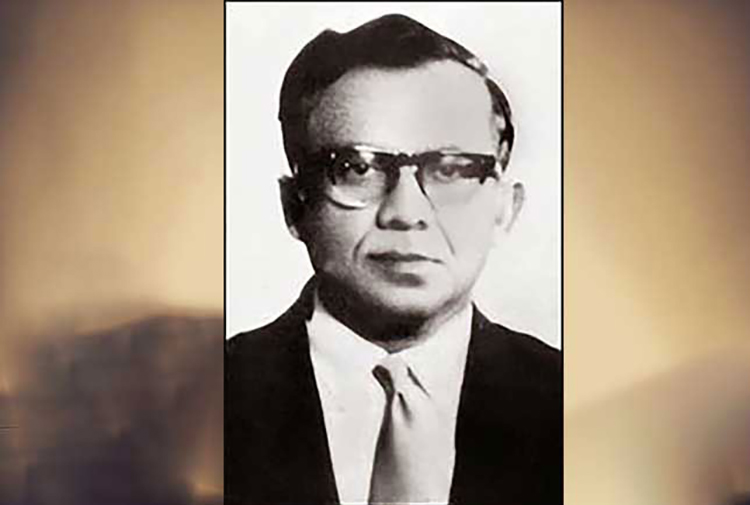
This year marks a significant milestone as we commemorate the 35th death anniversary of a titan in the field of education, Professor J. E. Jayasuriya. While his name is etched onto the covers of countless textbooks and cited in every major policy document in Sri Lanka, the man behind the name remains a mystery to many. To honour his legacy, we are joined today for a special commemorative interview. This is a slightly expanded version of the interview with Professor Elsie Kothelawala. As a former student who rose to become a close professional colleague, she offers a rare, personal glimpse into his life during his most influential years at the University of Peradeniya.
Dr. S. N. Jayasinghe – Professor Kothelawala, to begin our tribute, could you tell us about the early years of Professor J. E. Jayasuriya? Where did his journey start?
Prof. Elsie Kothelawala – He was born on February 14, 1918, in Ahangama. His primary education actually began at Nawalapitiya Anuruddha Vidyalaya. He then moved to Dharmasoka College in Ambalangoda and eventually transitioned to Wesley College in Colombo. He was a brilliant student, in 1933, he came third in the British Empire at the Cambridge Senior Examination. This earned him a scholarship to University College, Colombo, where he graduated in 1939 with a First-Class degree in Mathematics.
Q: – His professional rise was meteoric. Could you trace his work life from school leadership into high academia?
A: – It was a blend of school leadership and pioneering academia. At just 22, he was the first principal of Dharmapala Vidyalaya, Pannipitiya. He later served as Deputy Principal of Sri Sumangala College, Panadura.
A turning point came when Dr. C.W.W. Kannangara invited him to lead the new central school in the Minister’s own electorate, Matugama Central College. Later, he served as Principal of Wadduwa Central College. In 1947, he traveled to London for advanced studies at the Institute of Education, University of London. There, he earned a Post Graduate Diploma in Education and a Master of Arts in Education. Upon returning, he became a lecturer in mathematics at the Government Teachers’ Training College in Maharagama. He joined the University of Ceylon’s Faculty of Education as a lecturer in 1952 and later, in 1957, he advanced to the role of Professor of Education. Professor J. E. Jayasuriya was the first Sri Lankan to hold the position of Professor of Education and lead the Department of Education at the University of Ceylon.
The commencement of this department was a result of a proposal from the Special Committee of Education in 1943, commonly known as the Kannangara Committee.
Q: – We know he left the university in 1971. Can you tell us about his work for the United Nations and UNESCO?
A: – That was a massive chapter in his life. After retiring from Peradeniya, he went global. He moved to Bangkok to serve as the Regional Advisor on Population Education for UNESCO. He spent five years traveling across Asia, to countries like Pakistan, the Philippines, Indonesia, and Malaysia, helping them build their educational frameworks from the ground up.
Even after that, his relationship with the United Nations continued. He returned to Sri Lanka and served as a United Nations Advisor to the Ministry of Education for two years. He was essentially a global consultant, bringing the lessons he learned in Sri Lanka to the rest of the world.
Q: – How did you personally come to know him, and what was the nature of your professional relationship?
A: – I first encountered him at Peradeniya during my Diploma in Education and later my MA. He personally taught me Psychology, and I completed my postgraduate studies under his direct supervision. He was notoriously strict, but it was a strictness born out of respect for the subject. The tutorials were the highlight. Every day, he would select one student’s answer and read it to the class. It kept us on our toes! He relied heavily on references, and his guidance was always “on point.” After my MA, he encouraged me to apply for a vacancy in the department. Even as a lecturer, he supervised me, I had to show him my lecture notes before entering a hall.
Q: – He sounds quite imposing! Was there any room for humor in his classroom?
A: – He had a very sharp, dry wit. Back then, there was a fashion where ladies pinned their hair in high, elaborate piles. He once remarked, “Where there is nothing inside, they will pile it all up on the outside.” Needless to say, that hairstyle was never seen in his class again!
Q: – Looking at the 1960s and 70s, what reforms did he promote that were considered innovative for that time?
A: – As Chairman of the National Education Commission (1961), he was a visionary. He promoted the Neighborhood School Concept to end the scramble for prestige schools. He also proposed a Unified National System of education and argued for a flexible school calendar. He believed holidays should vary by region, matching agricultural harvest cycles so rural children wouldn’t have to miss school.
Q: – One of his major contributions was in “Intelligence Testing.” How did he change that field?
A: – He felt Western IQ tests were culturally biased. He developed the National Education Society Intelligence Test, the first standardized test in national languages, and adapted the Raven’s Non-Verbal Test for Sri Lankan children. He wanted to measure raw potential fairly, regardless of a child’s social or linguistic background.
Q: – How would you describe his specific contribution to the transition to national languages in schools?
A: – He didn’t just support the change, he made it possible. When English was replaced as the medium of instruction, there was a desperate lack of materials. He authored 12 simplified Mathematics textbooks in Sinhala, including the Veeja Ganithaya (Algebra) and Seegra Jyamithiya (Geometry) series. He ensured that “language” would no longer be a barrier to “logic.”
Q: – After his work with the UN and UNESCO, why did he become known as the “Father of Population Education”?
A: – While in Bangkok, he developed the conceptual framework for Population Education for the entire Asian region. He helped dozens of countries integrate population dynamics into their school curricula. He saw that education wasn’t just about reading and writing, it was about understanding the social and demographic realities of one’s country.
Q: – Madam, can you recall how Professor Jayasuriya’s legacy was honoured?
A: – Professor Jayasuriya was truly a unique personality. He was actually one of the first Asians to be elected as a Chartered Psychologist in the U.K., and his lectures on educational psychology and statistics were incredibly popular. During his time at the University of Ceylon, he held significant leadership roles, serving as the Dean of the Faculty of Arts and even as acting Vice Chancellor. His impact was so profound that the Professor J. E. Jayasuriya Memorial Lecture Theatre at the Faculty of Education in Peradeniya was named in his honor.
Beyond his institutional roles, he received immense recognition for his service, including honorary D. Lit and D. Sc degrees from the University of Colombo and the Open University, respectively. Perhaps his most global contribution was his ‘quality of life’ approach to population education developed for UNESCO in the mid-1970s. As O. J. Sikes of UNFPA noted in the International Encyclopedia on Education, it became the predominant teaching method across Asia and is still considered the fastest-growing approach to the subject worldwide.
Q: – Finally, what is the most profound message from his life that today’s educators and policymakers should carry forward?
A: – The lesson is intellectual integrity. When the government’s 1964 White Paper distorted his 1961 recommendations for political gain, he didn’t stay silent, he wrote Some Issues in Ceylon Education to set the record straight.
He believed education was a birthright, not a competitive filter. Today’s policymakers must learn that education policy should be driven by pedagogical evidence, not political expediency. As our conversation came to a close, Professor Elsie Kothelawala sat back, a reflective smile on her face. It became clear that while Professor J. E. Jayasuriya was a man of rigid logic, and uncompromising discipline, his ultimate goal was deeply human, the upliftment of every Sri Lankan child.
Thirty-five years after his passing, his presence is still felt, not just in the archives of UNESCO or the halls of Peradeniya, but in the very structure of our classrooms. He was a pioneer who taught us that education is the most powerful tool for social mobility, provided it is handled with honesty. As we commemorate this 35th memorial, perhaps the best way to honor his legacy is not just by remembering his name, but by reclaiming his courage, the courage to put the needs of the student above the convenience of the system.
Professor Jayasuriya’s life reminds us that a true educator’s work is never finished, it lives on in the teachers he trained, the policies he shaped, and the national intellect he helped ignite.
by the Secretary J.E.Jayasuriya Memorial Foundation : Dr S.N Jayasinghe
-

 Business2 days ago
Business2 days agoZone24x7 enters 2026 with strong momentum, reinforcing its role as an enterprise AI and automation partner
-

 Business6 days ago
Business6 days agoSLIM-Kantar People’s Awards 2026 to recognise Sri Lanka’s most trusted brands and personalities
-

 Business7 days ago
Business7 days agoAll set for Global Synergy Awards 2026 at Waters Edge
-
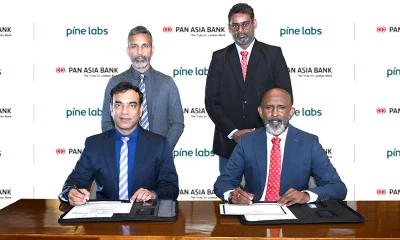
 Business6 days ago
Business6 days agoAPI-first card issuing and processing platform for Pan Asia Bank
-

 Business2 days ago
Business2 days agoHNB recognized among Top 10 Best Employers of 2025 at the EFC National Best Employer Awards
-

 Business2 days ago
Business2 days agoGREAT 2025–2030: Sri Lanka’s Green ambition meets a grid reality check
-

 Editorial4 days ago
Editorial4 days agoAll’s not well that ends well?
-

 Features4 days ago
Features4 days agoPhew! The heat …


